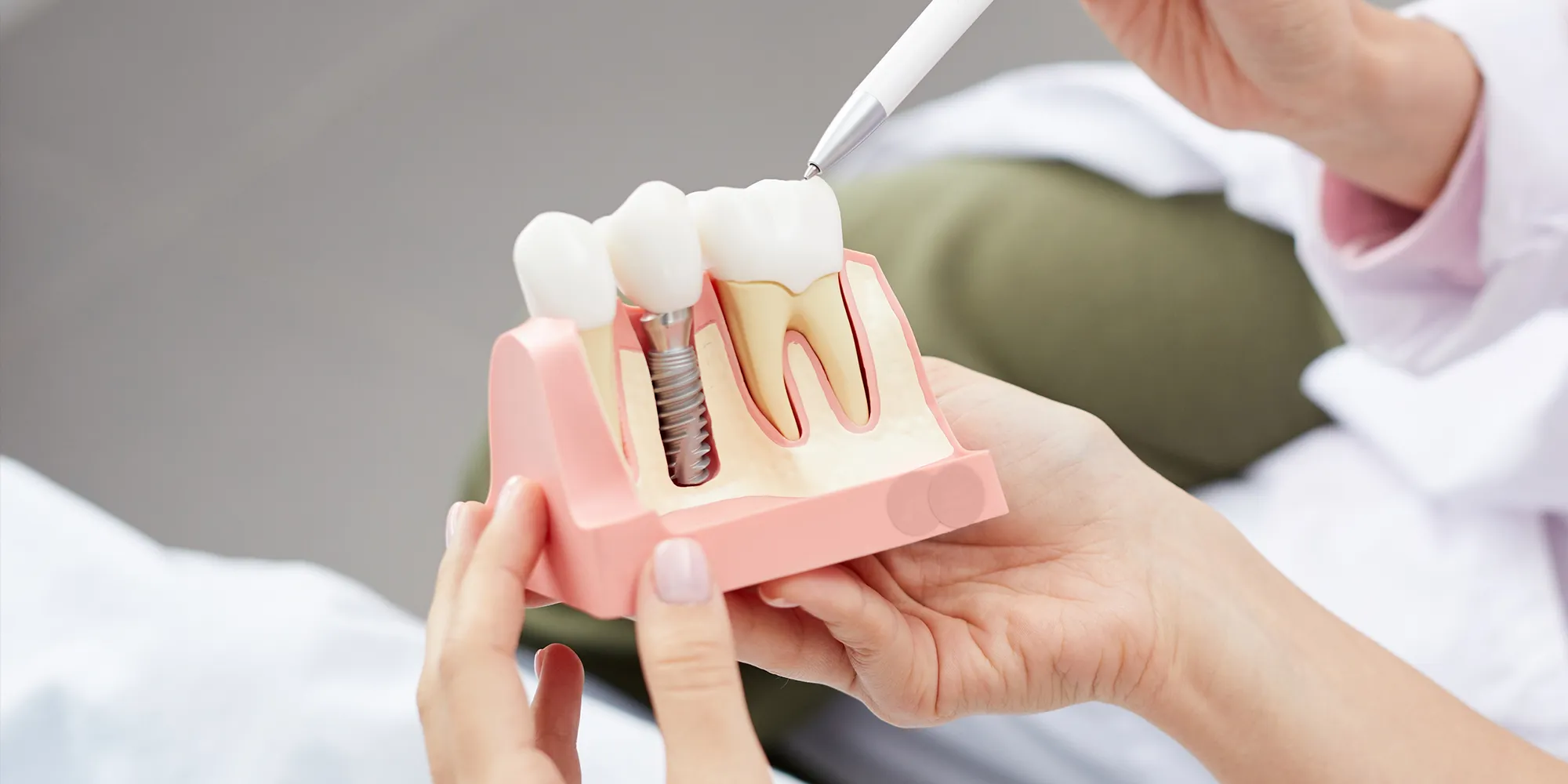What Is a Dental Bridge?
A dental bridge is a permanent tooth replacement that “bridges” the gap left by missing teeth. The procedure involves reshaping two healthy teeth on either side of the gap to serve as abutments, then placing crowns connected to an artificial tooth (pontic) in between.
The main advantage of a dental bridge is that it’s relatively quick and doesn’t require surgery like dental implants do. However, since the supporting teeth must be filed down, their natural structure can become weaker over time.
What Is a Dental Implant?
A dental implant is a modern solution designed to mimic the natural root of a tooth.
This procedure involves inserting a titanium screw into the jawbone, which fuses with the bone through a process called osseointegration. Once stable, a crown is attached on top, offering a look and function nearly identical to natural teeth.
The key advantage of implants lies in their ability to maintain jawbone density and preserve the surrounding teeth. Since no other teeth are altered, the natural structure remains intact. In terms of comfort and aesthetics, dental implants feel the most natural whether you’re speaking, eating, or smiling.
Impact on Surrounding Teeth
A major difference between dental bridge vs implant is how they affect healthy teeth.
In a dental bridge, the adjacent teeth need to be reshaped to support the artificial bridge, meaning part of their natural structure must be sacrificed.
Meanwhile, a dental implant stands independently without affecting other teeth, making it ideal for maintaining oral integrity.
Procedure and Treatment Duration
The two procedures differ in their process and timeline:
Dental Bridge: Usually completed within 2–3 visits over 1–2 weeks. Ideal for those seeking faster results without surgery.
Dental Implant: Takes longer since the implant must integrate with the jawbone (3–6 months). Once stable, the crown is placed. Though the process takes more time, the result is significantly more durable and long-lasting.
Maintenance and Longevity: An Investment in Your Smile
A dental bridge can last up to 10 years or more, depending on the health of the abutment teeth and overall oral hygiene.
Dental implants, on the other hand, are renowned for their durability, lasting 15 to 20 years, or even a lifetime with proper care. Because implants stand alone, they’re easier to clean, while bridges require extra attention under the pontic area where plaque can accumulate.
Both are long-term investments that demand commitment to good oral hygiene and regular dental check-ups.
Factors to Consider
Choosing between dental bridge vs implant requires a thorough evaluation. Key factors include:
Bone condition and density
Number and position of missing teeth
Overall health condition
Strength of supporting teeth
Aesthetic goals, time, and budget
Consulting with a professional dentist is crucial to finding a solution that fits both your dental needs and lifestyle.
Conclusion
Both dental bridges and dental implants have their own advantages.
If you prefer a faster, non-surgical solution, a dental bridge may be ideal. But if you’re seeking the most natural, strong, and long-lasting result, dental implants are the best form of permanent tooth replacement for lasting comfort and confidence.
References
Hill, S., Bailey, S., & Hamson, A. (2023, March). Dental bridges for partial tooth loss: CADTH health technology review [Internet]. Canadian Agency for Drugs and Technologies in Health. https://www.ncbi.nlm.nih.gov/books/NBK596304/
Gupta, R., Gupta, N., & Weber, K. K. (2025, January). Dental implants. In StatPearls [Internet]. StatPearls Publishing.https://www.ncbi.nlm.nih.gov/books/NBK470448/

